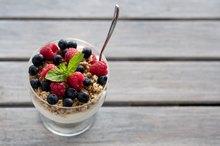Fruits That Help With Bloating
Large meals and certain foods can make you feel lethargic, gassy and bloated. Bloating is when your stomach looks and feels full and tight. According to nutrition educator Roseanna Lee, this condition typically occurs when you have too much water and gas in your body. Other causes include swallowing air, constipation, acid reflux, irritable bowel syndrome, overeating, lactose intolerance and weight gain. Stave off bloating by eating fruits with a high water content and the right nutrients to aid digestion.
If you are experiencing serious medical symptoms, seek emergency treatment immediately.
Citrus Fruits
Oranges and grapefruits contain 80 to 90 percent water. Your body retains water when you need it most so you don’t get dehydrated. The water content of citrus fruits hydrates you and signals to your body that it’s OK to flush out extra water, which also eliminates extra salt. Lemons are a natural diuretic and act as a laxative when mixed with warm water, according to registered dietitian David Grotto. Drink lemon water or splash lemon juice onto just about any food you are cooking.
Melons
Food Sources That Contain Water
Learn More
As its name suggests, watermelon is another water-dense food. This fruit contains 92 percent water. Watermelon and other melons, including honeydew and cantaloupe, are natural diuretics, causing you to urinate excess water and salt out of your body. Potassium also helps you excrete sodium and relieve bloating. The potassium content in melons will help you reach the recommended daily intake of 4,700 milligrams.
Avocado
Bloating is often caused by the inability to digest the foods you’ve eaten. Digestive enzymes are categorized by their ability to break down carbohydrates, fat, protein and fiber, getting food out of your digestive tract to prevent gas and bloating. Avocado contains the digestive enzyme lipase, which breaks down fat. Its high potassium content also helps you eliminate water.
Pineapple
What Causes Abdominal Bloating After Eating?
Learn More
Pineapples contain 85 percent water, but they also boast the digestive enzyme bromelain. Bromelain is a peptide that breaks down protein. The University of Maryland Medical Center notes that bromelain has been used for centuries in Central and South America to care for indigestion. Chop up pineapple and enjoy it raw, add it to salads or mix it in with entrees, such as fajitas, for a unique and sweet flavor.
Related Articles
References
Writer Bio
Michelle Fisk began writing professionally in 2011. She has been published in the "Physician and Sports Medicine Journal." Her expertise lies in the fields of exercise physiology and nutrition. Fisk holds a Master of Science in kinesiology from Marywood University.









